Dinosaurs Weren’t Killed By A Massive Asteroid, It Was Something Much More Unexpected
We are all familiar with the good ol’ story that the Chicxulub impactor hit our beloved planet 66 million years ago and wiped out all of our reptile friends.
So, what really wiped out the dinosaurs? Brace yourselves, because it turns out it wasn't just a colossal asteroid crashing into Earth. No, it wasn't the impact itself that sealed the dinosaurs' fate. It was the cosmic dust cloud it kicked up.
Advertisement
 Source: Google Images
Source: Google Images
Picture this: 66 million years ago, a hefty 10-kilometer-wide asteroid named Chicxulub collided with Earth. This cosmic rock packed an energy punch greater than a billion nuclear bombs combined. But it wasn't the bang that did it.
A new study, hot off the press in the journal Nature, suggests that it was the fine silicate dust created from pulverized rocks that threw the planet into chaos. This fine dust set off a global cooling event of epic proportions.
Palaeontologist Prof Stephen Brusatte spilled the beans to BBC Science Focus, saying, "The explosion wasn't really what doomed the dinosaurs and all the other species that died. The dust and soot that went up into the atmosphere put the Earth into a deep chill and blocked out the Sun for at least a couple of years.
With plants unable to photosynthesize, ecosystems crumbled like houses of cards. It was probably these tiniest dust particles that had one of the greatest killing effects on life."
Advertisement
 Source: Google Images
Source: Google Images
Previously, the prime suspects for Earth's dramatic cool-down were sulfur released by Chicxulub's impact and the soot generated by post-impact wildfires. But hold onto your asteroid helmets, because the latest research from the Royal Observatory of Belgium suggests fine dust was the silent assassin.
They took a closer look at rock materials from Tanis, a well-preserved fossil site in North Dakota, known for its Chicxulub impact evidence. What did they find? More fine silicate debris, less than 8 micrometers across, than they had anticipated.
Their simulations indicate that this dust could have hung around in Earth's atmosphere for a staggering 15 years after the asteroid's big entrance, causing a whopping 15°C drop in surface temperature. Talk about a chilly reception!
According to these new findings, dust, along with soot and sulfur, would have played a devilish trio, blocking plants from photosynthesizing for a couple of years. This triggered a domino effect, leading to the demise of various animal species.
Advertisement
 Source: Google Images
Source: Google Images
So, in a nutshell, the dinosaurs weren't jumped by the asteroid itself but by the cosmic dust cloud it created. And just like that, the dinosaurs, who had been around for about 165 million years (compared to our 300,000 years of existence), were nearly wiped out.
The Chicxulub asteroid and its aftereffects took out an estimated 75% of life forms on the planet, including non-flying dinosaurs and large mammals.
After the dust settled, life persevered in the form of small avian dinosaurs and mammals, many of which eventually evolved into the fantastic array of life we see today.
So, it wasn't the impact itself but the after-effects that reshaped the course of life on Earth. Who would've thought that such tiny dust particles held the key to one of the biggest extinctions?
Related Articles
- Gorilla Tries To Run Into Cold Water, Regrets It, And Then Acts Cool As If Nothing Bad Happened
- The Heartwarming Tale Of Gentle Outcast Cat's Journey From The Streets To Loving Home In NYC
- Cat Left Behind In Apartment When His Family Moved Is Happy When Finally Adopted After 5 Months Of Waiting
- Man Out Paddle Boarding Suddenly Realizes He Has Chance Encounter With A Very Curious Manatee
- Woman Finds Flowers All Over Bedroom Every Day - Then Relizes They Were Left By A Secret Admirer
- This Man Stops To Rescue 'Angry' Animal In The Road—And Ends Up Making A Friend
- Photographer Spots A Haunting Face Pleading For Help On Beach
- Shoppers Are Completely Stunned As They Spot A Face Pleading For Help At Store’s Glass Door
- Couple Adopts Bulldog Who Looks Similar To Their Pet and Gets A Big Surprise
- Man Sets Up Owl Nesting Box, Then Surprisingly Discovers Fluffy Visitor Inside
Share this article
Advertisement